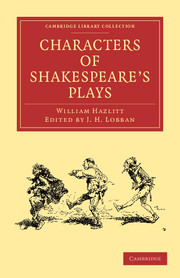Book contents
- Frontmatter
- Preface
- Contents
- Introduction
- Preface
- Cymbeline
- Macbeth
- Julius Cæsar
- Othello
- Timon of Athens
- Coriolanus
- Troilus and Cressida
- Antony and Cleopatra
- Hamlet
- The Tempest
- The Midsummer Night's Dream
- Romeo and Juliet
- Lear
- Richard II
- Henry IV
- Henry V
- Henry VI
- Richard III
- Henry VIII
- King John
- Twelfth Night; or, what you will
- The Two Gentlemen of Verona
- The Merchant of Venice
- The Winter's Tale
- All's Well That Ends Well
- Love's Labour's Lost
- Much Ado About Nothing
- As You Like It
- The Taming of the Shrew
- Measure for Measure
- The Merry Wives of Windsor
- The Comedy of Errors
- Doubtful plays of Shakespear
- Poems and Sonnets
- Notes
Antony and Cleopatra
Published online by Cambridge University Press: 07 September 2010
- Frontmatter
- Preface
- Contents
- Introduction
- Preface
- Cymbeline
- Macbeth
- Julius Cæsar
- Othello
- Timon of Athens
- Coriolanus
- Troilus and Cressida
- Antony and Cleopatra
- Hamlet
- The Tempest
- The Midsummer Night's Dream
- Romeo and Juliet
- Lear
- Richard II
- Henry IV
- Henry V
- Henry VI
- Richard III
- Henry VIII
- King John
- Twelfth Night; or, what you will
- The Two Gentlemen of Verona
- The Merchant of Venice
- The Winter's Tale
- All's Well That Ends Well
- Love's Labour's Lost
- Much Ado About Nothing
- As You Like It
- The Taming of the Shrew
- Measure for Measure
- The Merry Wives of Windsor
- The Comedy of Errors
- Doubtful plays of Shakespear
- Poems and Sonnets
- Notes
Summary
This is a very noble play. Though not in the first class of Shakespear's productions, it stands next to them, and is, we think, the finest of his historical plays, that is, of those in which he made poetry the organ of history, and assumed a certain tone of character and sentiment, in conformity to known facts, instead of trusting to his observations of general nature or to the unlimited indulgence of his own fancy. What he has added to the actual story, is upon a par with it. His genius was, as it were, a match for history as well as nature, and could grapple at will with either. The play is full of that pervading comprehensive power by which the poet could always make himself master of time and circumstances. It presents a fine picture of Roman pride and Eastern magnificence: and in the struggle between the two, the empire of the world seems suspended, “like the swan's down-feather,
“That stands upon the swell at full of tide,
And neither way inclines.”
The characters breathe, move, and live. Shakespear does not stand reasoning on what his characters would do or say, but at once becomes them, and speaks and acts for them. He does not present us with groups of stage-puppets of poetical machines making set speeches on human life, and acting from a calculation of problematical motives, but he brings living men and women on the scene, who speak and act from real feelings, according to the ebbs and flows of passion, without the least tincture of pedantry of logic or rhetoric.
- Type
- Chapter
- Information
- Characters of Shakespeare's Plays , pp. 78 - 83Publisher: Cambridge University PressPrint publication year: 2009First published in: 1908

